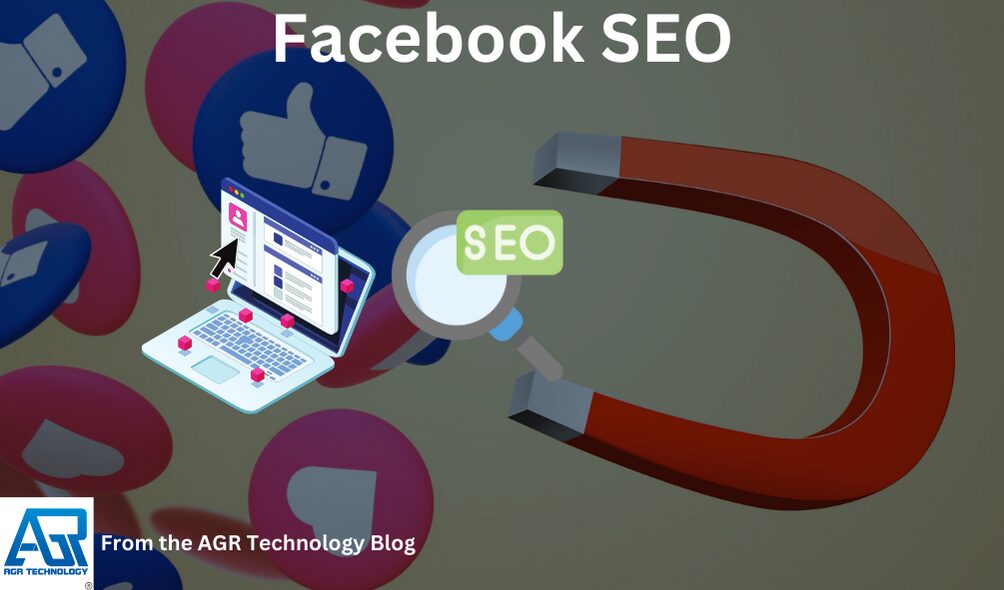In today’s digital landscape Facebook remains a powerhouse for businesses seeking to expand their online visibility. Search engine optimization (SEO) isn’t just for websites anymore as everything becomes more connected and online competition grows maintaining a strong “omnipresence” across multiple platforms has become increasingly important.
We’ve discovered that implementing targeted SEO for Facebook can dramatically improve your brand’s discoverability and attract more potential customers. By optimizing your page’s content and understanding Facebook’s complex algorithm you’ll create a strong foundation for digital marketing success and help rank your Facebook page alongside your website for different terms.
Need help with your SEO strategy? Contact AGR Technology
Understanding Facebook SEO Basics

Facebook SEO requires strategic optimization techniques that differ from traditional website search strategies. Our approach focuses on understanding the platform’s unique ranking mechanism and key factors that influence content visibility.
Key Ranking Factors on Facebook
Facebook’s ranking factors center on engagement metrics and content relevance. We’ll explore the critical elements that determine a page’s search performance:
User Engagement:
- Likes
- Comments
- Shares
- Post interactions
- Time spent on content
Content Quality:
- Original multimedia content
- Relevance to target audience
- Consistency of posting
- Use of keywords
- Alignment with user interests
Page Authority:
- Page completeness
- Profile optimization
- Verified status
- Follower count
- Regular activity level
How Facebook’s Algorithm Works
Facebook’s algorithm prioritizes personalized content experiences through sophisticated ranking mechanisms:
Relevance Score:
- Measures potential user interest
- Analyzes past interaction patterns
- Predicts likelihood of engagement
Recency:
- Newer posts receive higher visibility
- Timely content ranks higher
- Consistent posting improves algorithmic preference
Connection Strength:
- Evaluates user relationships
- Prioritizes content from close connections
- Rewards pages with strong follower interactions
Our optimization strategies align with these algorithmic principles to maximize Facebook page visibility and engagement.
Optimizing Facebook Page for Search
Facebook page optimization requires strategic keyword placement and precise categorization to enhance search visibility. Our optimization techniques focus on maximizing page discoverability across both Facebook’s internal search and external search engines.
Creating Keyword-Rich Page Descriptions
Crafting compelling page descriptions demands precision and strategic keyword integration. We recommend developing descriptions that:
- Incorporate primary business keywords naturally
- Limit description length to 155 characters for optimal display
- Include location-specific terms for local SEO enhancement
- Use action-oriented language that reflects brand identity
- Avoid keyword stuffing while maintaining overall relevance
Selecting the Right Page Categories
Page category selection directly impacts search optimization and audience targeting. We advise businesses to:
- Choose the most specific category matching core business offerings
- Select primary and secondary categories for comprehensive representation
- Align categories with actual service/product characteristics
- Update categories periodically to reflect business evolution
- Consider how selected categories influence search algorithm rankings
Content Strategies for Better Visibility
Developing strategic content remains crucial for improving Facebook page visibility. Our optimization techniques focus on creating posts that not only engage users but also perform well in search results.
Crafting Engaging and Searchable Posts
Effective Facebook posts demand a strategic approach to content creation. We recommend developing posts that balance user engagement with search optimization principles. Key strategies include:
- Create original multimedia content (images, videos, infographics)
- Write descriptive captions with strategic keyword placement
- Maintain consistent posting schedule
- Include clear calls-to-action
- Use rich, informative text that provides immediate value
Post length optimization matters significantly. Facebook’s algorithm favors posts between 40-80 characters that generate immediate user interaction. We suggest crafting posts that:
- Prompt comments and shares
- Use active language
- Address specific user needs
- Include relevant internal links
Using Relevant Hashtags and Keywords
Hashtag and keyword selection represents a critical component of Facebook SEO strategy. Our approach involves:
- Research trending industry-specific hashtags
- Limit hashtag usage to 2-3 per post
- Select keywords with high search volume
- Integrate natural language variations
- Avoid overstuffing content with keywords
- Placing primary keywords in first 3-5 words
- Using long-tail keywords that match user search intent
- Incorporating location-based keywords for local businesses
- Monitoring keyword performance through Facebook Insights
Technical SEO for Facebook Profiles
Technical optimization plays a critical role in improving a Facebook profile’s search visibility and performance. We’ll explore the specific technical elements that can enhance a Facebook page’s SEO potential.
Page Metadata Optimization
Metadata serves as the foundational framework for Facebook profile search optimization. We focus on strategic metadata elements that signal relevance to both Facebook’s internal algorithm and external search engines.
Key metadata optimization strategies include:
Title Tag Optimization
- Craft concise titles containing primary business keywords
- Limit title length to 60-70 characters
- Include brand name and core service descriptor
- Avoid keyword stuffing
About Section SEO
- Integrate primary and secondary keywords naturally
- Use 155-character description with clear value proposition
- Include location and service-specific terms
- Ensure grammatical accuracy and readability
Alt Text for Images
- Include relevant keywords specific to business context in your posts as within images if possible
- Use clear, precise language describing image content
- Optimize image file names with relevant keywords
Link Building Within Facebook
Strategic internal linking amplifies profile discoverability and establishes content authority. We recommend implementing advanced link-building techniques specific to Facebook’s ecosystem.
Internal Page Connections
- Link to related business pages and groups
- Create cross-referenced content between owned pages
- Use strategic anchor text matching target keywords
- Maintain relevance and contextual integrity
External Link Integration
- Share links from authoritative industry websites
- Embed website links in page description
- Use trackable URL parameters
- Balance external references with native Facebook content
Engagement-Driven Linking
- Encourage user-generated content with shareable links
- Participate in industry-specific Facebook groups
- Comment on relevant posts with contextual link references
- Monitor link performance through Facebook Insights
Facebook SEO Tools and Analytics
Monitoring and analyzing your Facebook page’s performance is crucial for developing effective SEO strategies. We’ll explore the key tools and analytics that can help businesses optimize their Facebook presence and track meaningful engagement metrics.
Tracking Page Performance
Facebook provides robust performance tracking capabilities that enable businesses to measure their page’s SEO effectiveness. Key metrics to monitor include:
| Performance Metric | Significance | Tracking Method |
|---|---|---|
| Page Views | Indicates audience reach | Directly visible in page insights |
| Post Engagement Rate | Measures content effectiveness | Calculated through likes, comments, shares |
| Reach Percentage | Shows content visibility | Displayed in Facebook Insights dashboard |
| Click-Through Rate | Evaluates link performance | Tracked through URL parameters |
Performance tracking helps identify content strategies that resonate with your target audience. We recommend analyzing these metrics weekly to refine your Facebook SEO approach and optimize content for maximum visibility.
Using Facebook Insights Effectively
Facebook Insights offers comprehensive analytics that go beyond basic engagement metrics. The platform provides:
Demographic Analysis
- Audience age and gender distribution
- Geographic location of followers
- Peak engagement times
Content Performance Evaluation
- Top-performing post types
- Engagement rates by content category
- Viral content identification
Audience Growth Tracking
- Follower acquisition trends
- Page like sources
- Audience growth rate
By leveraging these insights, businesses can develop data-driven strategies that align with their audience’s preferences and optimize their Facebook SEO efforts.
Local SEO Tactics for Facebook
Local businesses can dramatically improve their Facebook visibility by implementing targeted geographical optimization strategies. These techniques help businesses connect with nearby customers and enhance their local search presence.
Geo-Targeting Strategies
Geo-targeting on Facebook allows businesses to precision-target local audiences through several strategic approaches:
Location-Based Targeting
- Use Facebook’s detailed location targeting settings
- Narrow audience by city, zip code, or radius
- Specify precise geographic boundaries for ad campaigns
Local Keyword Integration
- Include city and neighborhood names in page descriptions
- Incorporate location-specific keywords naturally
- Create content referencing local landmarks or events
Check-In and Location Services
- Enable location services for business page
- Encourage customer check-ins and tagged locations
- Use Facebook Places to increase local discoverability
Accurate Business Information
- Complete all profile sections thoroughly
- Ensure NAP (Name, Address, Phone) consistency
- Verify business details match Google My Business listing
Local Audience Engagement
- Post locally relevant content
- Share community events and neighborhood news
- Highlight local customer testimonials
Visual Localization
- Use location-specific imagery
- Feature local team members
- Showcase local business environment and operations
Localized Metadata Optimization
- Create page title with city and primary service
- Write description highlighting local expertise
- Use geographically relevant hashtags
Local Review Management
- Actively respond to customer reviews
- Encourage local customer feedback
- Showcase positive local testimonials prominently
Conclusion
Facebook SEO isn’t just a strategy—it’s a powerful approach to amplifying your digital presence. By implementing targeted optimization techniques we can transform our Facebook page from a simple social platform into a robust marketing tool that drives visibility and engagement.
The key is consistent implementation and continuous learning. Our digital landscape evolves rapidly and staying adaptable will ensure we remain competitive. Strategic keyword placement thoughtful content creation and leveraging Facebook’s built-in analytics will help us unlock our page’s true potential.
Ultimately successful Facebook SEO requires a holistic approach that combines technical optimization compelling content and data-driven insights. By dedicating time and resources to these strategies we’ll position our brand for greater online discoverability and meaningful audience connections.
Frequently Asked Questions
What is Facebook SEO?
Facebook SEO is the process of optimizing your Facebook page and content to improve its visibility in both Facebook’s internal search and external search engines like Google. It involves strategic keyword placement, engaging content creation, and understanding Facebook’s complex algorithmic ranking factors to enhance your page’s discoverability and audience reach.
Why is Facebook SEO important for businesses?
Facebook SEO is crucial because it helps businesses increase their online visibility, attract more potential customers, and improve engagement. A well-optimized Facebook page can appear in search results, drive organic traffic, and provide a powerful platform for brand marketing. By implementing effective SEO strategies, businesses can expand their digital presence and connect with their target audience more effectively.
How does Facebook’s algorithm impact page visibility?
Facebook’s algorithm prioritizes content based on relevance score, post recency, and connection strength. It evaluates user engagement metrics like likes, comments, and shares to determine content visibility. Pages with higher engagement, original multimedia content, and consistent posting schedules are more likely to appear in users’ feeds and search results, making strategic optimization critical for enhanced discoverability.
What are key strategies for Facebook page optimization?
Key optimization strategies include crafting keyword-rich page descriptions, selecting precise page categories, creating engaging original content, using relevant hashtags, maintaining a consistent posting schedule, and incorporating strategic keywords naturally. Focus on writing descriptive captions, using multimedia content, and implementing clear calls-to-action to improve page visibility and user engagement.
How can businesses improve their Facebook SEO ranking?
Businesses can improve their Facebook SEO ranking by creating high-quality, original content, maintaining an active posting schedule, encouraging user interaction, using relevant keywords and hashtags, optimizing page metadata, and leveraging Facebook Insights for performance tracking. Engage with followers, respond to comments, and continuously analyze and adapt your content strategy.
What technical SEO elements should be optimized on Facebook?
Technical SEO elements for Facebook include optimizing title tags, crafting concise page descriptions with primary keywords, using alt text for images, implementing strategic internal and external linking, completing the “About” section with relevant information, and ensuring accurate business details. Regularly update your profile with precise, keyword-rich content to enhance discoverability.
How important are hashtags in Facebook SEO?
Hashtags are crucial in Facebook SEO as they help categorize content and improve searchability. Use trending, industry-specific hashtags sparingly and naturally. Aim for 1-2 relevant hashtags per post, integrate them seamlessly into your content, and choose variations that align with your target audience’s search behaviors to enhance content visibility.
Can local businesses benefit from Facebook SEO?
Local businesses can significantly benefit from Facebook SEO by using geo-targeting techniques, integrating local keywords, maintaining accurate business information, and engaging with local audiences. Utilize Facebook’s location settings, showcase local testimonials, respond to reviews, and create content that resonates with nearby customers to improve local search visibility.
What metrics should businesses track for Facebook SEO?
Essential metrics for Facebook SEO include page views, post engagement rate, reach percentage, click-through rate, audience demographics, and content performance. Use Facebook Insights to analyze these metrics, identify successful content strategies, understand audience preferences, and continuously refine your SEO approach to maximize visibility and engagement.
How often should businesses post on Facebook for optimal SEO?
For optimal SEO, businesses should aim to post consistently, ideally 3-5 times per week. Quality trumps quantity, so focus on creating engaging, original content that provides value to your audience. Maintain a regular posting schedule, use multimedia content, and monitor engagement metrics to determine the most effective posting frequency for your specific audience.
Other content on our blog:

Alessio Rigoli is the founder of AGR Technology and got his start working in the IT space originally in Education and then in the private sector helping businesses in various industries. Alessio maintains the blog and is interested in a number of different topics emerging and current such as Digital marketing, Software development, Cryptocurrency/Blockchain, Cyber security, Linux and more.
Alessio Rigoli, AGR Technology
![logo-new-23[1] logo-new-23[1]](https://agrtech.com.au/wp-content/uploads/elementor/thumbs/logo-new-231-qad2sqbr9f0wlvza81xod18hkirbk9apc0elfhpco4.png)
